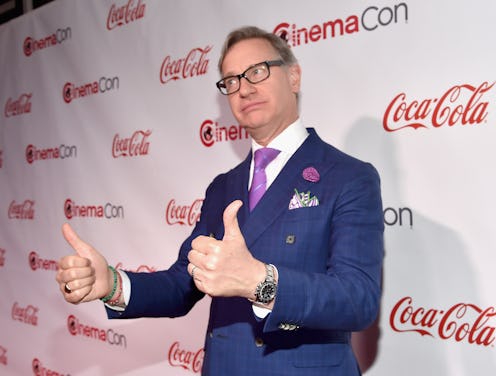Entertainment
Paul Feig Has The Best Reason For Making Female-Driven Movies

Bridesmaids, Spy, The Heat, and Ghostbusters have three major things in common: They are all tremendously funny; feature a strong, female leading cast; and are movies directed by Paul Feig. And according to Flavorwire, at the Tribeca Film Festival on Tuesday night, Feig revealed why he makes female-driven comedies, and his answer revealed a great deal about what Hollywood has been lacking in recent years.
Speaking with Saturday Night Live's Michael Che during a Tribeca Talk, Feig admitted that he "got so frustrated watching comedy," when he first "got in the business," based on the lack of diverse, funny roles for women in modern comedies. But, especially so, when he compared those movies to the way in which women were represented in the movies of old Hollywood. Per Flavorwire, Feig explained,
"Women had such terrible roles — especially because growing up, I was watching with my mom, these movies from the ‘30s and ‘40s, with Rosalind Russell and Katharine Hepburn, and they were really equals to men. And then I watched it just devolve to where women were just eye candy, or they were perfect, or they were mean. So it was a reaction to that, and also because I knew so many funny women, and I’d see them in movies."
He added that though funny women landed parts, like Sarah Silverman in School of Rock, they didn't get to show off their humor. Feig continued, "They just make her be this really mean girlfriend, and it’s like, well, that’s not fair. Why does she not get to be funny?” Overall, his words are such a slam dunk of a statement that Feig basically ripped the net off the damn wall, and I'm inspired to start cheering. Because seriously, he's so right. In 2017, Feig remains one of the few filmmakers who regularly positions complex, well-written female characters as the leads of his movies.
This, in itself, is still something of a rarity in ratio to the number of major studio movies starring men (the Center For The Study Of Women In Television And Film revealed that only 29 percent of protagonists were female in the top 100 films of 2016). But comedy, in particular, remains something of a boys club, with the archaic question of "Are women funny?" still regularly echoing down those grim echo chambers of the internet on a regular basis.
In February, for example, the British comedian Ayesha Hazarika responded to the fact that people are still googling whether women are funny or not with a stellar response written for The Guardian, in which she stated,
This big fat “are wimmin funny” question still hovers round us like a rotting elephant carcass and as a result, a lot of comedy that people see is very male, very pale and a bit stale. We still live in an age where men are thought of as being the masters of humour. Women are allowed to be funny, but in controlled numbers.
Meanwhile it's sadly not a rarity to see female comedians, like the amazing Jen Kirkman, responding to such a question on Twitter. And may I repeat, it's 2017: Dudes need to accept that women are hilarious and just move on with their lives.
This is exactly why I value Feig as a filmmaker and deeply respect the work that he's putting out there. By making female-driven comedies, he's actively challenging the notion that women aren't funny. But he's also challenging the tired tropes that have come to define what many terrible female characters in Hollywood movies get tarnished as being: void of complexity, sexually objectified, or lacking a sense of reality.
What Feig's statement highlights is how truly frustrating it is to witness a movie industry which, at times, can feel truly archaic, for these very reasons. Comedy exists irrespective of gender. But if characters aren't well-written and complex, or if the roles simply aren't there for women to take advantage of, then, of course, funny women will be a rarity on screen.
Here's hoping that Hollywood will soon be more accommodating for such movies, actors, and roles, and that nobody will ever need to ask, "Are women funny?" ever again. Because, come on. As if you have to ask.